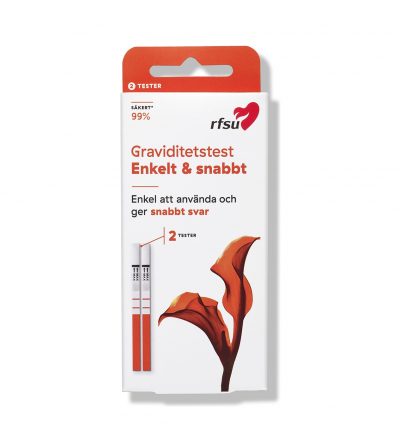
Get to know your menstrual cycle
It can help you feel safer by learning more about the whole menstrual cycle and to know better how the body works, especially if you are trying to get pregnant.
The menstrual cycle in numbers
Do you have regular periods? Regular menstruation means that your period comes at regular intervals of 25-32 days. The time can vary by up to four days for an individual without their menstrual cycle being considered irregular.
The menstrual cycle is counted from the first day of one period until the first day of the next. It lasts on average about 28 days and ovulation occurs roughly in the middle of the menstrual cycle.
How the menstrual cycle works
The menstrual cycle starts on the first day of the period and often lasts 3-6 days. When the period ends, a new egg immediately begins to mature in the ovaries, and the lining of the uterus builds up to receive a fertilized egg.
Ovulation occurs approximately 14 days before the next period starts. A mature egg leaves the ovary and travels down the fallopian tube where it can be fertilized by sperm. At the same time, the lining of the uterus grows, to be able to receive and nourish a fertilized egg. If the egg is not fertilized, the lining is expelled as a bleed about two weeks after ovulation and the menstrual cycle begins again.
If you want to get pregnant and calculate from the menstrual cycle when you are most likely to be ovulating, use our ovulation calendar.
It does happen from time to time that you get a period without having ovulated.
Can you influence the length of your menstrual cycle?
The menstrual cycle is controlled by the hormones in the body, and it is not possible to influence whether it should be longer or shorter. But with medication it is possible to influence both the length of the menstrual cycle and ovulation. If an investigation shows a hormonal disorder that causes the egg not to mature properly, you will not ovulate and you will not be able to get pregnant. In such a case, a special type of hormone can be used to stimulate ovulation.
Can you have a period without ovulating?
It does happen from time to time that you get a period without having ovulated. It happens to everyone and is nothing to worry about. In order for an egg to be released, there must be sufficiently high levels of the estrogen hormone in the blood. Sometimes the levels are too low and no egg is released, but the lining of the uterus carries on growing. When the mucous membrane has become thick enough, it eventually comes off on its own. Then you get bleeding that can be a little longer than a normal period.
Menstruation without ovulation gets more common when you reach the age of 40, when ovulation occurs less frequently. The menstrual bleeding is often longer, but hurts less.
Irregular menstruation and ovulation
When you want to get pregnant, it can be difficult having an irregular period and not knowing if and when, you are ovulating. In such a case, you can use an ovulation test to find out if you are ovulating. The ovulation test measures the LH hormone in the urine and shows the two most fertile days in a menstrual cycle. You may need to test every day over an extended time to work out the right days.
Source: www.1177.se and fact-checked by the RFSU clinic











